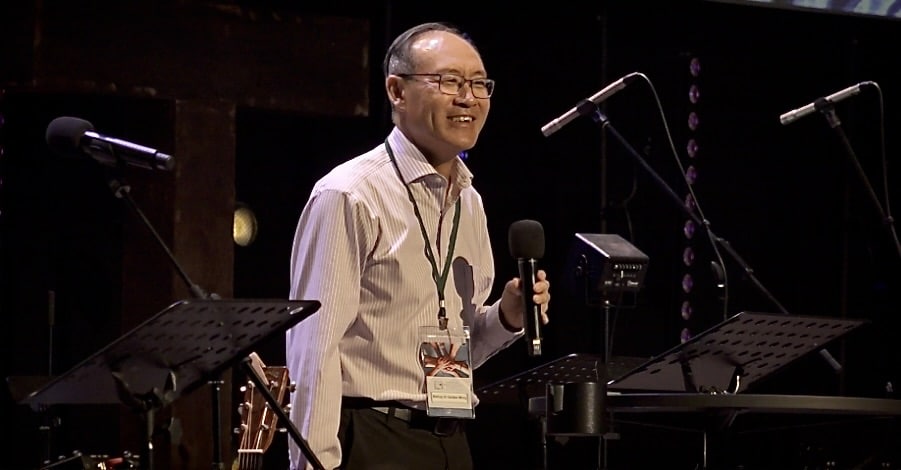There is hope for weary souls: Rev Dr Gordon Wong, Bishop of The Methodist Church in Singapore, to pastors
by Christine Leow // July 18, 2023, 3:44 pm

"Psalm 88 is one of the ways in which God tries to help us understand that sometimes it is okay to not always be feeling okay," said Bishop Dr Wong, addressing church leaders on the first day of the Christian Mental Health Conference 2023.
The inclusion of Psalm 88 is proof that “God understands this darkness which we sometimes experience” and our lonely struggles with mental well-being, said Rev Dr Gordon Wong, Bishop of The Methodist Church in Singapore, as he addressed church leaders on the first day of the Christian Mental Health Conference (CMHC) on July 6.
“You have distanced loved ones and neighbours from me. Darkness is my only friend,” he quoted the psalm as he spoke on Hope for Weary Souls, adding: “That final phrase in the Hebrew psalm is so terse and so broken to be almost incoherent. And perhaps that broken incoherence itself complements the anguished theme in Psalm 88.
“That brokenness also explains why translators interpret the phrase in different ways.”
The two-day conference (July 6-7) sought to equip participants with the knowledge and tools to support the mental health of those in the community and the Church.
Of the 341 participants from 134 churches, a third were full-time workers in church, about a quarter were pastors and nearly 20% were church lay leaders. In addition, 80 were from the mental health sector.
Mental illness isolates
Rev Dr Wong shared that verse 18 of Psalm 88 was the inspiration for the title of a book by theologian and priest of an Episcopal church, Kathryn Greene-McCreight. Ps Kathryn struggles with bipolar disorder.
In Darkness Is My Only Companion, she explores what happens to the soul when the mind is ill.
Rev Dr Wong pointed out that, in the New International Version (NIV), the psalmist is thought to have only darkness as his closest friend. In the Revised Standard Version (RSV), Psalm 88:18 is translated as “my companions are in darkness”.
Psalm 88 is proof that “God understands this darkness we sometimes experience” and our lonely struggles with mental well-being.
“That translation conveys the anger that we feel when our friends or even our family seem to be totally in the dark concerning the nature of the suffering we are going through,” he said.
“And the sort of advice that they offer – ‘pray harder, try harder to just get up and do it’ – shows that they are in darkness.
“To quote Ps Kathryn, ‘They do not understand that the sick individual cannot simply shrug off or pull out of it.’”
Bishop Dr Wong noted that the Jewish translation renders the same phrase in Psalm 88 as “my companions are out of my sight”. Friends who do not understand those with mental illness are “in that sense not present when you need them the most”.
“Whatever the exact nuance of the phrase in Psalm 88, what is clear is that God understands this darkness which we sometimes experience,” he added.
“The inclusion of Psalm 88 in Holy Scripture is one of the ways in which God tries to help us understand that sometimes it is okay to not always be feeling okay.”
Wait and hope
For the souls who are weary, especially pastors, Bishop Dr Wong offers some wisdom and hope.
God’s promises are key to providing hope to weary souls.
“I have some experience in being a weary soul. I have been a pastor for many years, and I’ve often felt weary. And so maybe I can share something on hope for some fellow weary souls.
“But if you are neither a pastor, nor a weary soul this morning, then please excuse this rather weary soul’s attempt to share a message of God’s hope.”
Sharing from Isaiah 40:29-31, Bishop Dr Wong said that to “wait on the Lord” (Isaiah 40:31) was to “keep expecting and hoping for the promises of God to be fulfilled”.
God’s promises, then, are key to providing hope to weary souls.
A prophet discouraged
But what wearies the soul? Isaiah 40:6-8 provides the answer as to why the prophet Isaiah was weary. But to understand the verses, a lesson in punctuation is necessary.
Said Bishop Dr Wong: “Ancient Bible manuscripts did not use punctuation marks – no commas, no full stops, no open and close quotation marks.
“And this is one of the many reasons why Bible scholars will sometimes interpret certain verses differently. This is true of Isaiah 40:6-8.”
Like many pastors today, Isaiah was feeling very weary that all that he was doing seemed to produce no lasting results.
In the NIV translation, the punctuation makes it look like the answer to the prophet’s question: “What shall I cry?” is to talk about how fleeting the faithfulness of people can be.
“This punctuation is possible. But it is probably wrong,” said Bishop Dr Wong.
Instead, the close quotation mark should come at the end of verse 6.
“What difference does this punctuation make? In the way that I think it shouldn’t be punctuated, we see a happy and willing prophet, all ready to obey the commission to preach.
“Instead, in response to the divine call to cry out or proclaim God’s Word, the prophet’s reply is not the happy, willing response that says, ‘Here I am, Lord. What do you want me to cry out? Tell me and I’m preaching.’
“Instead, we hear a prophet whose response is sad and discouraged, maybe even a little cynical. Certainly, the reply of a prophet who was feeling weary.
“‘Cry out? What shall I cry? All people are like grass, and their faithfulness, the glory, the beauty are just like flowers in the field.’ We all know that grass and flowers fade away.”
Like many pastors today, Isaiah was feeling very weary that all that he was doing seemed to produce no lasting results.
Focus on the enduring Word
To soothe his despair, God replies Isaiah 40:7 by affirming his feelings.
“’You may be right that people are just like grass.’ The first part of God’s answer surprises me.
“Isaiah was not called to produce human success and results. He was called to proclaim faithfully the divine Word of God.”
“If a pastor came up and told me that he was feeling weary and discouraged because his ministry seemed to be producing no lasting results, I would have tried to cheer him up by saying something like, ‘Don’t be so hard on yourself. You may not be able to see the results. But people have been blessed and changed. One day you will see how your work has borne good fruit in their lives. Your labour is not in vain in the Lord.’”
But, instead, God acknowledges that “people are just like grass”.
“God reminds Isaiah that his calling is to preach God’s Word which endures forever.
“Right near the start of his calling, Isaiah was warned that he would be proclaiming God’s word to people who would not seem to hear, would not be really interested in listening.
“And so Isaiah should not focus on some human KPI, some key performance indicators of productive visible results.
“Isaiah was not called to produce human success and results. He was called to proclaim faithfully the divine and enduring Word of God.”
Exchange your strength for His
Something happens when we persist despite our weariness.
Referring to Isaiah 40:29-31, Bishop Dr Wong said: “If we can keep on waiting, keep on believing, keep on hanging on, keep on hoping in the promises of God’s Word, here is one of those divine promises: The promise of new strength for the weary.”
“God is offering a change in strength – a new strength, a divine strength, in exchange for our fading human strength.”
This promise is mentioned three times in as many verses. But the strength they get is not their own.
“The pronoun and NIV translation of verse 31, ‘They will renew their strength’, I think it’s slightly misleading.
“We should delete the pronoun there. The Hebrew doesn’t include the pronoun. It reads simply, ‘They will change or exchange strength.’
“God here is not saying that He will renew that normal human strength which has become very low. God here promises us a new type of strength.
“He is offering us an exchange, a change in strength – a new strength, a divine strength, in exchange for our fading human strength.”
Walking the valleys of life
Finally comes the sequence in Isaiah 40:31.
“It has been noticed that the sequence of words in verse 31 seems a bit anticlimactic.
“’They will soar on wings like eagles. They will run and not be weary. They will walk and not be faint.’ Wouldn’t it be even more inspiring if the sequence had been reversed? They will walk? No. They will run? No. They will soar.”
The descending sequence in action, Bishop Dr Wong noted, is actually more meaningful because we need God’s new strength – not just when we soar – but when we are in the “dark valleys and trials of everyday life”.
God’s strength and grace helped her walk through the almost daily valleys of despair and hopelessness.
“Many times, life with its daily challenges does not let us run by or fly over so quickly. Life challenges often require us to walk through them, walk in, not quickly, but slowly, avoiding the many potholes and pitfalls.
“And perhaps walking through the mundane and oftentimes monotonous journey of everyday life requires more strength or stamina, more energy than the exciting flying over or running along the highest mountain.”
Bishop Dr Wong ended with a poem by Annie Johnson Flint whose life was marked by tragedy. Her mother died when she was only three. Her father followed when she was seven. At 16, she was diagnosed with severe arthritis. By the age of 20, she could no longer walk or control her bowels. Then cancer struck.
Yet her biography is full of hope. In The Making of the Beautiful, she testified that despite the weariness and the darkness of endless day-to-day suffering, God’s strength and grace helped her walk through the almost daily valleys of despair and hopelessness.
God giveth more grace, when the burdens grow greater,
He sendeth more strength when the labours increase;
To added affliction, He addeth His mercy,
To multiplied trials His multiplied peace.
He giveth more grace when the burdens grow greater.
He sendeth more strength when the labours increase;
To added affliction, He addeth His mercy,
To multiplied trials His multiplied peace.
When we have exhausted our store of endurance,
When our strength has failed before the day is half done,
When we reach the end of our hoarded resources,
Our Father’s full giving has only begun.
His love has no limit
His grace has no measure,
His power has no boundary known unto men;
For out of His infinite riches in Jesus
He giveth, and he giveth, and giveth again!
RELATED STORIES:
We are an independent, non-profit organisation that relies on the generosity of our readers, such as yourself, to continue serving the kingdom. Every dollar donated goes directly back into our editorial coverage.
Would you consider partnering with us in our kingdom work by supporting us financially, either as a one-off donation, or a recurring pledge?
Support Salt&Light



